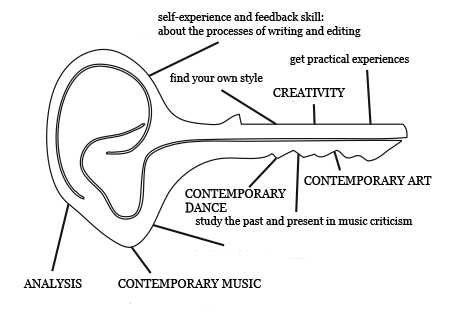


A critic needs in addition to the courage of criticizing [blaming for, censuring] also the courage to respect [the achievments of the artists] (Eduard Hanslick 1894)
Music criticism course
NEWS
Spring
semester 2014
Music
criticism course during
the spring semester
90%
E-course &
stationary
course
More
info: coming soon
Register
Conditions
First meeting February 5, 2014!
Read
MuKriErikursus 2007–2010, 2012 and 2013 articles/summaries (in
Estonian and English):
www.luubiall.ee
muusikaarvustaja.blogspot.com
AIM OF THE COURSE
Registeerimine
Tingimused
Struktuur
Materjalid
Muusikaarvustaja
LUUBI
ALL
Kontakt
Developing
the critical, analytical and openmindedness of students. Enable
them to find their own style and obtain practical experiences.
Learning from other critics (from the past and present) and
reflect the own writing process.
Development of music
criticism. Introduction to different styles and forms of
criticism, tasks of the critic, resposnibility and possibilities,
and the question of objectivity. Experiencing practically how
text are „born“, what is the background of a critic, his/her
inspiration and motivation, and which role plays editing and
formalization/issuing of texts. Learning from other critics (from
the past and present). Analysis of contemporary music as a
broader phenomenon (from academic to rock/pop music). Focus on
writing about contemporary music and contextualizing it as
part of contemporary art (music, art, dance) as a whole.

OPENMINDEDNESS
CREATIVITY
COURAGE
RESPONSIBILITY
HOW TEXTS “ARE BORN” AND HOW THEY ARE EDITED
CONTEMPORARY MUSIC, ART, DANCE, PERFORMANCE, INTERDISCIPLINARY EVENTS
Practical work: visit festivals and concerts or other events including contemporary music. Text analysis and editing tasks. If possible invited guest lecturers (experienced critics and editors) included.
Materjal
for the course:
http://musiccriticismcourse.wordpress.com
Main themes of the course
Text types and
analysis of texts
How
texts are „born“ and how the writing process
works
Inspirational
sources
Rules
and frames of writing (depending
of the specific of the publication medium)
Reader,
audience
Background
and experiences of the writer
Process
of creation, editing and formatizing
Language,
special issues connected to languages
Terms
Sources
of information
Time
Editing
Inspirational
sources
Rules
and frames of writing (depending of the specific of the
publication medium)
Reader, focusgroup
Background
and experiences of the editor
Process
of creation, editing and formatizing
Language, special issues
connected to languages
Terms
Sources of
information
Time
Format,
style, direction, aim, context of the publication
medium
Depending
on what traditions?
What
are new challenges (in digital times)?
Relationship
and cooperation of/between author and editor.
LEARNING OUTCOME OF THE COURSE
I
Students orientate primarily in music criticism: introducing
forms of (music) criticism through overview texts (scientific and
lexicon texts).
II Writing an essee on specific music,
analysis, philosophy topics, enables students to extent their
background knowledge.
III Students are able to analyse
different types of criticism texts
IV Students obtain self
cognition: how writing process works, find your own style and
courage also to review contemporary music/ art
V Editing -
students are enabled to reflect and judge: how editing process
works, what are formal-content-psychology and assessment problems
Main
lecturer of the course: Gerhard Lock (musicologist and
composer)
Tallinn University Institute of Fine Arts Department
of Music - lecturer/
EAMT – doctoral student
musicology
Course assistent 2009-2011: Mari-Liis
Rebane
EKA Animation student / Pöff Animated Dreams projekt
leader
Several guest lecturers
(CC) Kujundus: Mari-Liis Rebane (logo), Gerhard Lock (kodulehe struktuur, veebimeister), disained OpenOffice/NeoOffice'iga, muusikaarvustaja[at]gmail.com
© 2010-2014 MuKriErikursus Tallinna Ülikool, Kunstide Instituut, Muusika osakond, Narva mnt 25/38, 10120, Tallinn (Eesti), (+372)6411444, www.tlu.ee/muusika